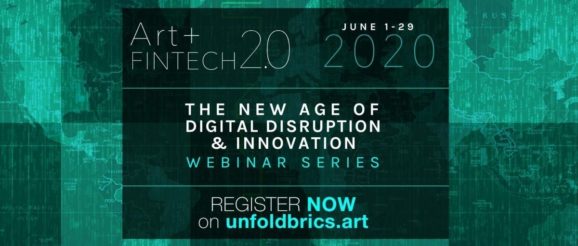Art + Fintech 2.0 Summit To Explore Innovation, Digitization And The Online Art Marketplace With Global Leaders And Entrepreneurs – IntelligentHQ

The impact of technology on art has been a constant throughout history. As technology developments shape our daily lives, so too does it have an impact on the art world. Not only from a creative perspective, but also the way art is traded, collected and produced. This innovation and digitisation are only a few of the topics that UNFOLD Art XChange, the art business conference and summit platform, will explore in its second edition of the Art + FinTech art and technology summit.
Conceived as a 14-session digital event across four weeks in June 2020, Art + FinTech 2.0 will bring together more than 40 global art market leaders and tech entrepreneurs in a series of keynote addresses, conversations and panel discussions about the online art trade, new-media art, virtual reality, blockchain technology and sustainability.
Art + FinTech 2.0 aims to uncover, examine and debate the new age of digital disruption and innovation in the wake of the covid-19 pandemic. The summit will be attended by collectors, museum and art fair directors, curators, gallerists, artists, fintech leaders and blockchain technology experts.
“UNFOLD Art XChange was conceived as an innovative art business conference and summit platform. It aims to become one of the largest multicultural art exchanges, bringing together diverse voices across local,regional and international art landscapes,” said Rachel Rekkab, Founder of UNFOLD Art XChange.
And she added: “In light of the current global situation, with nearly a third of the globe in enforced isolation and the art world at a standstill, UNFOLD Art XChange has decided to examine the need to speed up the global transition towards a digital art economy.
At Art + FinTech 2.0, we will explore how the coronavirus pandemic is pushing the art world into an era of digitization and online. I hope this webinar series will offer a new and stimulating virtual experience, bringing together thought-provoking leaders in the art and tech worlds to share best practice, help us to innovate and come out stronger when the pandemic ends.”
Among the event highlights will be an exclusive session with one of the most influential figures in the blockchain industry, Joseph Lubin. He s a co-founder of the Ethereum platform, and the founder of ConsenSys, a decentralized blockchain production studio. He will discuss the potential uses of blockchain in the art market. Lubin will be joined by tech entrepreneurs from OpenSea, SuperRare, dada.art, Nifty Gateway, Cryptovoxels, Mintbase and NonFungible.com.
Millennial collectors,including Astrid Hill, Maria Baibakova and Eugenio ReRebaudengo, will discuss innovative developments in the art world and new ways of working, while artist Paul McCarthy will talk about his multimedia artistic practice and experiments with virtual reality. They will be joined by leading museum directors and curators, including Sabine Himmelsbach, Alfred Weidinger and Christiane Paul, gallerists such as Johann König, and collectors including Adam Lindemann, Anita Zabludowicz, Masha and Jens Faurschou and Dominique and Sylvain Levy.
Themes that will be discussed on the web seminars
Online art trade
The online art market has been growing steadily — to almost $5bn in 2018, according to the 2019 Hiscox Online Art Trade Report. The trend has been accelerated by the global pandemic, with art fairs and galleries rapidly developing online viewing rooms. Art +Fintech 2.0 will examine the latest developments in the digitization and virtualization of the art market. Speakers will discuss the potential of augmented and virtual reality (AR and VR) and artificial intelligence (AI) for arts businesses. They will also consider how these technologies can ensure future success and contribute to creating a more sustainable art ecosystem.
New-media art
New-media art has been a rapidly developing field, embracing extended reality (XR), VR and AR as well as internet-based work and generative art. With many museums and galleries closed,the lockdown has encouraged greater audience exploration and sharing of screen-based works of art. Nevertheless, the perception remains that new-media art is difficult to display, collect and maintain. The webinar sessions will consider the best ways of exhibiting, collecting, conserving and building new-media art collections. The speakers will also discuss how to build audiences for innovative digital art forms.
Blockchain technology
Distributed ledger technology — or blockchain — has been widely discussed in the art market since 2018, particularly its potential to establish ownership, provenance and authenticity, smooth out transactions and create secure “smart contracts”. Art + Fintech 2.0 will discuss recent developments, including initiatives such as Art Identification Standard, which aims to make it easier to trace, identify and protect works of art. Joseph Lubin, one of the co-founders of Ethereum, will speak about the possibility of blockchain creating a new, more transparent art economy.
Other speakers will discuss the evolution of blockchain collectibles, also known as non-fungible tokens, to create unique, irreproducible works of art, and the rise of crypto art and blockchain-powered virtual reality realms. Meanwhile, Christiane Paul from the Whitney Museum of American art will explain how the museum is experimenting with blockchain to encourage new models of art patronage.
Art + FinTech 2.0 runs from June 1st to 29th, with sessions every Monday and on selected Fridays. After registration, delegates will be able to participate in the live webinars and watch videos of the sessions on the Art + Fintech 2.0 Big Marker platform.
